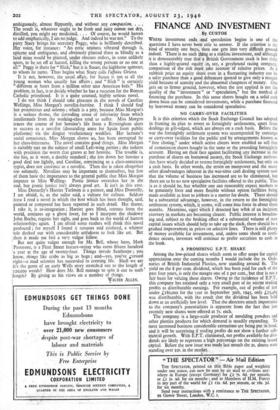FINANCE AND INVESTMENT
By CUSTOS
WHERE investment ends and speculation begins is one of the questions I have never been able to answer. If the criterion is the kind. of security one buys, then one gets into very difficult ground indeed: 'There is no such thing as a riskless investment, aril although it is demonstrably true that a British Government stock is less risky than a highly-geared equity in, say, a greyhound racing company, comparison of the risk must take account ofrelative prices. At a rubbish price an equity share even in a fluctuating industry can be a safer purchase than a good debenture quoted to give only a meagre yield because of scarcity and the abnormal cheapness of money. One gets on to firmer ground, however, when the test applied is not the quality of the " investment or " speculation " but the method of financing the purchase. In this sense shares laought on a solid cash down basis can be considered investments, while a purchase financed by borrowed money can be considered speculative.
NO CARRY-OVER FACILITIES
It is this criterion which the Stock Exchange Council has adopted in framing its plan to revert to fortnightly settlements, apart from dealings in gilt-edged, which are always on a cash basis. Before the war the fortnightly settlement system was accompanied by contango or carry-over facilities for the public and by arrangements known as " free closing," under which active clients were enabled to sell free of commission shares bought in the same or the preceding fortnightly account. Having set their face against facilitating any increase in the purchase of shares on borrowed money, he Stock Exchange authori- ties have wisely decided to restore fortnightly settlements;but only on a cash basis. In other words, the strain-on manpower and the many other disadvantages inherent in the war-time cash dealing system now that the volume of business has increased are to be eliminated, but there are to be no new specolative facilities offered to the public. That is as it should be, but .whefiitr one can reasonably expect markets to be genuinely freer and more flexible without option, facilities being made available at.least to jobbers is a matter for doubt. There should be a substantial advantage, however, in the return to the fortnightly settlement system, which, it seems, will come into force in about three months. Meantime, signg Which I detected last week of an incipient recovery in markets are becoming clearer. Public interest is broaden- ing and, subject to the braking effect of a substantial volume of new capital issues which should help to take up the slack, there should be a gradual improvement in prites on selective lines. There is still plenty of money available for investment, and, unless some shock to confi- dence occurs, investors will continue to prefer securities to cash in the bank.
A PROMISING E.P.T. SHARE
Among the low-priced shares which seem to offer scope for capital appreciation over the coming months I would include the 2S. Ordi- naries of Industrial Plastics, now standing around 8s. The yield on the 8 per cent. dividend, which has been paid for each of the past four years, is only the meagre one of 2 per cent., but that is not a fair basis for valuing these shares. Owing to the incidence of E.P.T., this company has retained only a very small part of its recent trading profits as distribtitable earnings. For example, out of profits of just under Lao,000 for the year to September 30th, 1945, only £23,464 was distributable, with the-result that the dividend has been held down at an artificially low level. That the directors attach importance to the company'S potentialities is apparent from the fact that just recently new shares were offered at 7s. each. The company is a large-scale producer of moulding powders and other plastics products for which demand is steadily expanding. To meet increased business considerable extensions are being put in hand, and it will be surprising if trading profits do not show a further sub- stlantial growth. With E.P.T. eliminated, net profits available for divi- dends are likely to represent a high percentage on the existing issued capital. Before the new issue was made last month the 2s. shares were standing over Jos. in the market.


























 Previous page
Previous page